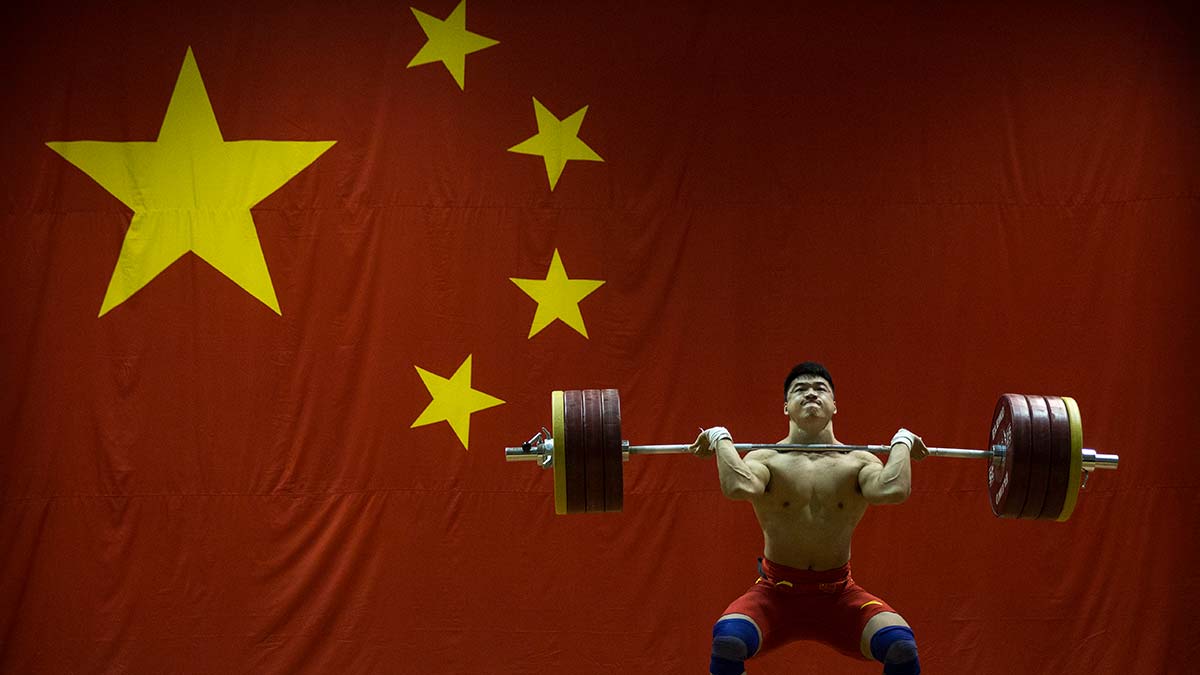Just how much more pain can China’s equity markets take?

Pic: Getty
Formerly high-falutin’ Chinese equities have continued a grim rout this week, suffering their worst declines since 2008, with the Hang Seng collapsing hard and fast on Friday following the news of a Covid-lockdown in the southern tech metropolis of Shenzhen.
Then yesterday, the Hang Seng China Enterprises Index just fell over – ending way, way down, closing more than 7% for the worse in its biggest intra-session collapse since circa late 2008.
There suddenly seems like nowhere left for Chinese equities to hide.
Hong Kong’s once vaunted Tech Index sheared through 11% of its value – that was the worst decline since the index began mid-pandemic in July 2020.
Even the reliable tech names like real estate and travel portals, JD.com and Trip.com, were among the tech gauge’s worst performers.
And Tencent! Saints and heavens preserve us. Those guys may as well just pack it all up.
All of this leaves the Hang Seng Tech worth some $2.1tn less than it was a little over 12 months ago.
Pick a headwind
There’s no shortage of heads-shoulders-knees-and-toe winds for Chinese stocks, which really have just continued to spiral after worst-best friend Russia asked for help in its war (possibly ill-advised) against Ukraine, and most especially after the US told Europe – erroneously – that China was answering the call. Both raised a lot of the popular heat directed against Chinese companies.
The market cap of Chinese majors trading on Wall Street collapsed as well overnight. Traders are wrought with doubts and fears over Beijing’s pre-war declaration of a ‘no limits’ public love-in with Russia and future potential delistings, adding salt to the wounds of more than $US1.1tn (add it up) losses ever since regulatory worries which started during the pandemic began to really leach into Chinese equities, where’er they may be.
Also not helping: Morgan Stanley
The bank that gave us Howie Hubler put a note out overnight trimming China’s economic forecast to absolute zero for the March quarter – previously a rise 0.6% on the previous quarter. It it now expects China will fluff its annual targets, which is pretty diabolical stuff since Premier Li Keqiang only made them to great acclaim in the Great Hall of the People in Tiananmen earlier last week.
After doubling and redoubling its Covid zero policy – just as Covid begins to spread exponentially across key regions – China’s apparently lost the confidence of analysts which only a week or so ago were praising the Middle Kingdom’s winning ways on stifling inflation and recovering from Covid.
Morgan Stanley has now lowered China’s 2022 GDP forecast to a 5.1% lift, down from 5.3% and below Premier Li’s target of circa 5.5%.
Over the weekend Hong Kong had around half a million residents back in isolation or home quarantine, as the daily death rates climb into the hundreds.
The former city-state is grappling with food shortages, sending out timely medical care packages and a neighbouring Shenzhen nursing a Covid-grudge, which state-media has quietly kindled.
Until at least March 20, some 18 million Shenzhen citizens are locked in hard, while the province of Jilin has been sealed off from the rest of the country, the first time since China first began to move on zero-Covid back in April 2020. New infections doubled over the weekend.
Public transport has been stopped and all but essential travel has been banned in some of China’s biggest cities, as authorities try to rein in the country’s worst coronavirus outbreak since Wuhan in 2020.
The Xinhua News Agency reports, the National Health Commission’s deputy director Lei Zhenglong, as saying on Monday more than 10,000 people had been infected so far this month, with cases spotting like a climate-induced bushfire across 27 of China’s 31 mainland provinces.
No, that crackdown’s not over either…
The flight to anywhere else comes as the American markets regulator, the Securities and Exchange Commission (SEC), hand-plucked a further five Chinese companies which make the list and could get themselves delisted but good, if they don’t play ball with harsher auditing requirements.
The now less-impressively named Nasdaq Golden Dragon China Index had circa 10% lopped off its value on Friday, again, the biggest hit since November 2008.
Back in Shanghai, Xinhua reports China’s once impervious entertainment giant Tencent is now facing a record fine for violating anti-money-laundering rules.
That trimmed another 9% off the company’s value.
…hmm, neither is this one
And, although lots of experienced analysts remain confident there won’t be another delisting skeet-shoot in the near-term, it’s the investor PCSD (Post Crackdown Stress Disorder) from that other crackdown – still fresh and visceral – which has everyone around Chinese equities grasping for the oxygen mask.
Beijing’s 2021 hatchet-job-crackdown on its once infallible tech-giants in a wonderful, terrifying and one-sided clash between public and private power, came hot on the heels of Hong Kong’s reabsorption into the mainland.
Xi Jinping’s year-long blunderbuss approach to reining in any power-base not entirely under the auspices of the state or the party, left casualties strewn across China’s top tier giants, and the party’s willingness to insert itself into and cause pain unto the market will be etched on the memories of those who saw it up close:
Totally smashed – the ubiquitous internet conglomerates Tencent and Alibaba.
Cooked – the money-banquet, food-delivery app Meituan.
Crashed – the Uberesque ride-hailing app Didi.
Not coming back – the many homegrown innovators which crossed the unseen line in online gaming, in private education and naturally, crypto.
Some we’ve already forgotten – can’t remember their names.
Since its February 2021 peak, that rocket to the moon China tech index has lost well over 60% in total value. It’s not great.
If it was Britney Spears, we’d be begging her Dad to retake the conservatorship.
UNLOCK INSIGHTS
Discover the untold stories of emerging ASX stocks.
Daily news and expert analysis, it's free to subscribe.
By proceeding, you confirm you understand that we handle personal information in accordance with our Privacy Policy.








